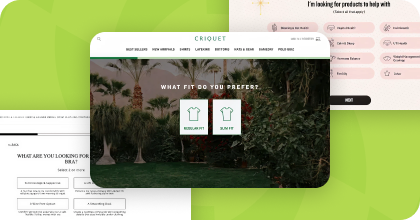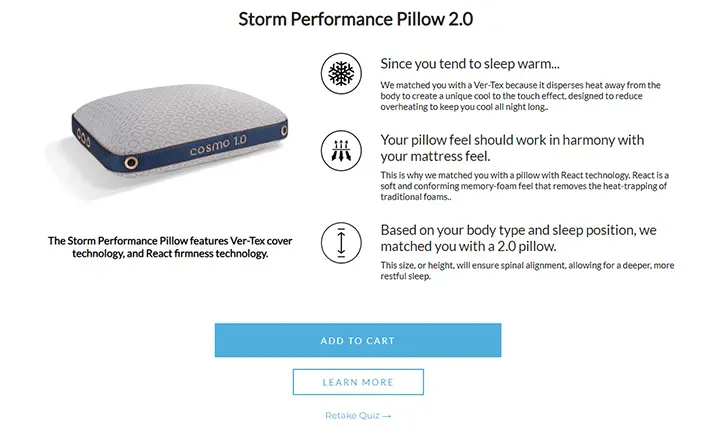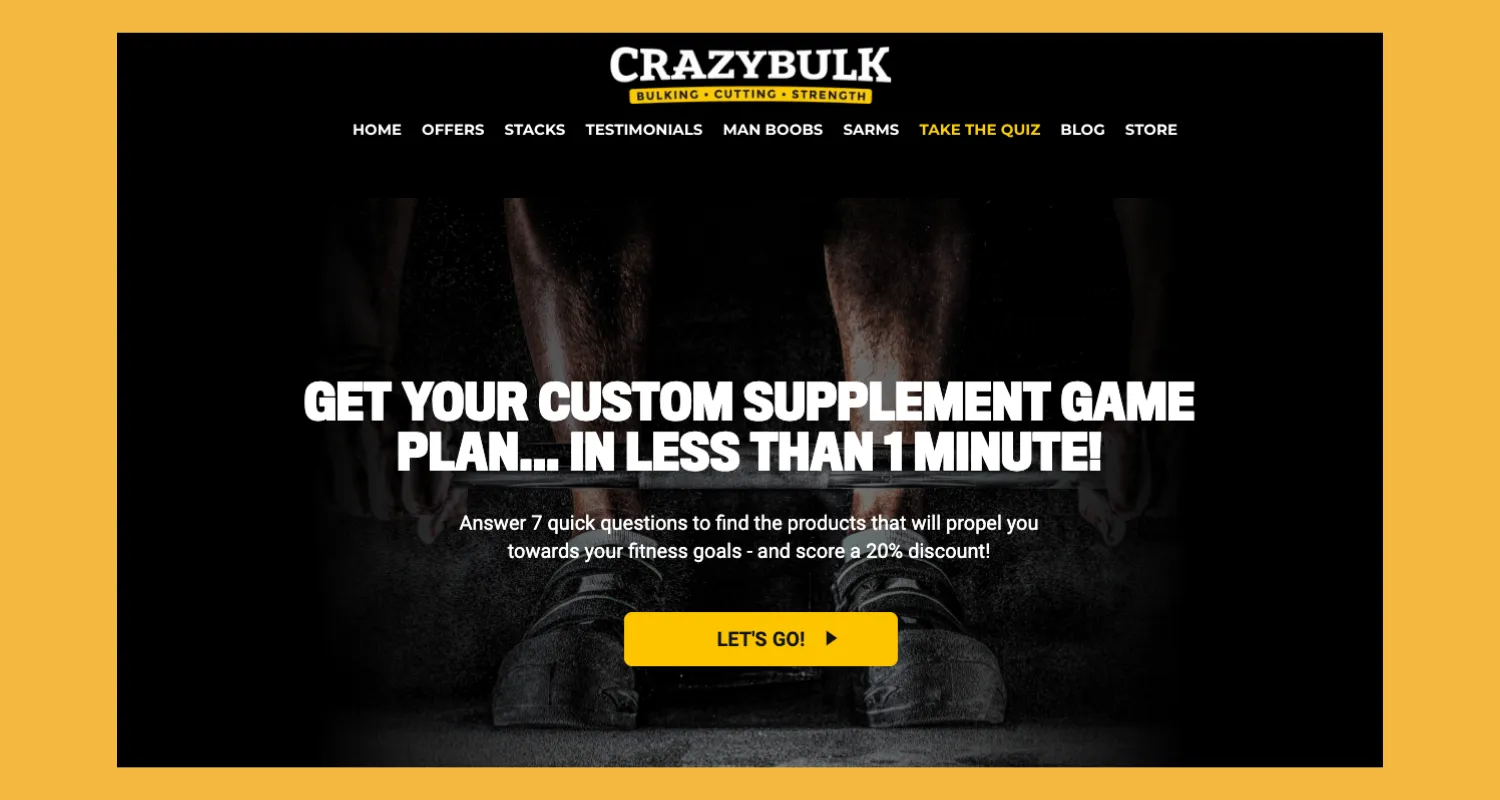March 25, 2025


Steal High-Converting Ideas From Leading DTC Brands
Browse 50+ real examples of personalized marketing funnels you can replicate today.
Collecting email addresses isn’t enough to generate qualified leads. Successful online retailers are turning to interactive quizzes (aka guided selling funnels) to engage visitors, collect valuable data, and guide potential customers into making buying decisions.
Interactive quizzes engage users in a way traditional marketing content can’t. Quiz quizzes can increase conversions while collecting customer data by providing an experience that feels more like entertainment than marketing. When done right a lead gen quiz can be one of your most powerful assets for filling your sales funnel with high intent prospects.
When BedGear put a personalized product recommendation quiz on their e-commerce site, they saw a 490% increase in conversions. Shoppers who took their PillowID quiz were 4.9x more likely to buy vs. those who didn’t. This isn’t an isolated success story – it’s the power of interactive quizzes for e-commerce lead generation.

This guide will walk you through how to use interactive quizzes to transform your e-commerce lead generation, engagement, and conversion rates. We’ll cover everything from quiz concept development to implementation and analysis so you can build a full marketing strategy around quiz-based lead gen.
Traditional lead magnets like ebooks and discount codes have their place, but they lack the interactivity of a quiz. While traditional lead magnets might get skimmed or downloaded and forgotten, quiz takers engage with your content for several minutes, answering questions and waiting for results.
Litter-Robot by Whisker, a pet tech company, discovered this engagement. After implementing a guided selling quiz, they saw a 388% increase in conversions in 30 days. This quiz is featured in their navigation bar and helps shoppers find their perfect product solution while building Whisker’s email list with qualified leads.

“Our quiz conversion rate has been higher than any other page or funnel we’re running,” says Whisker’s team. “It’s also helped us grow our email list and capture potential customer’s information to segment them into the correct email campaigns and flows.”
Using an online quiz maker to create interactive experiences allows you to capture leads in a more natural “give to get” approach. Instead of asking for contact information immediately, you provide value through an engaging experience and then ask for information.
Just like an in-store asscoaite would not come up to you and immediately ask for your email & phone number, a quiz mimics the in-store experience of asking helpful questions to guide your shoppers to the right products for them before asking for contact information.
Perhaps the most valuable part of lead gen through quizzes is the ability to collect zero-party data – information voluntarily shared by consumers about their preferences, interests, and pain points. This valuable data goes beyond basic contact information and allows you to build full contact profiles and buyer personas.
CrazyBulk, a fitness supplements brand, uses their product recommendation quiz to help shoppers navigate their 100+ product lineup. By asking targeted questions about fitness goals, dietary preferences and workout habits, CrazyBulk is collecting powerful zero-party data that feeds into their Klaviyo email marketing platform.

This integration allows them to segment their audience based on goals and preferences and send hyper-targeted email and SMS campaigns that drive higher retention and stronger shopper relationships.
With every question answered, quiz takers provide valuable insights into their needs, challenges, and preferences. This information can then be used to deliver personalized results and follow-up communications both onsite and via email marketing and, sms marketing that speak directly to their situation. The ability to gather information in this way makes quizzes great for understanding your target audience at a deeper level.
Not all leads are created equal. One of the biggest challenges in marketing is filtering out casual browsers from genuinely interested prospects. Quizzes excel at this by qualifying leads through their responses, essentially acting as an automated lead-scoring mechanism.
Obvi, a health and wellness brand specializing in collagen supplements, found that customers who took their product quiz had a 14% higher lifetime value than non-quiz takers. “They’re making better decisions because they’re better informed,” says Ronak Shah, Obvi’s Founder and CEO.

Designing questions that identify pain points, budget range, timeline, and other qualifying factors helps your lead gen quiz templates automatically segment participants based on their readiness to buy.
After struggling with limited customization and low engagement using their previous quiz platform (Octane AI), Obvi switched to a more flexible solution that allowed them to create a more personalized experience. Their completion rate went up to 80% and their conversion rate by 102%, proving that better quiz experiences lead to better lead quality.
Combining engagement, data collection and qualification makes lead gen through quizzes incredibly effective at driving conversions. Quiz results that offer personalized recommendations create a natural path to your product or service offerings making it much smoother from prospect to customer.
RANAVAT, a luxury Ayurvedic skincare brand, created a "Find Your Royal Ritual Quiz" to help shoppers find their perfect skincare products. After 90 days they saw their quiz takers convert at 294% higher than their site average. More importantly, these quiz participants contributed to 16% of their total online revenue and had higher average order value.
Businesses using quizzes as part of their marketing strategy are reporting not just more leads but better quality leads. These potential customers have a higher conversion rate because they’ve invested time in the quiz process and received personalized recommendations that address their specific needs. This lead gen potential is hard to match with other marketing methods.
The lead form is the most critical part of any lead gen quiz. A poorly designed form can ruin even the best quiz experience. Effective lead forms strike a balance – collect enough information to be useful without creating friction that causes abandonment.
To optimize your lead form:
Peak Wellness USA, a sauna company selling high-ticket items, is a great example of an effective lead form. Their quiz helps shoppers navigate complex product decisions while capturing valuable customer data. By offering to send personalized results via email, they’ve created a natural reason for visitors to share their contact information. This approach delivered a 300% increase in conversions and 37X ROI on their quiz.

Remember, the primary goal is to convert engaged quiz takers into leads you can nurture. Every additional field in your form may decrease conversion rates, so be thoughtful about what you ask for.
Standard one-size-fits-all quizzes are limited. The power of quiz marketing comes from using conditional logic to create branching paths that deliver truly personalized experiences. This logic allows you to show different questions based on previous answers and provide tailored results that feel custom made for each participant.
When designing Obvi’s product recommendation quiz, the team found that advanced conditional logic was key to delivering truly personalized recommendations. “The ability to say, ‘If it’s this, recommend this’ or ‘If it’s that, recommend two things’ was huge for us,” explains Ronak Shah. This dynamic approach increases the perceived value of your quiz, making participants more likely to share their contact information.
Advanced quiz makers offer robust conditional logic capabilities that let you:
A lead gen quiz shouldn’t exist in isolation – it should be part of your broader marketing ecosystem. Without connections to your CRM and email marketing platforms, the data you collect will go unused.
Whisker’s success with their quiz was amplified by its integration with Bloomreach. “We have every step tracked in Google Analytics now so we know where people are dropping off. The quiz is integrated with our Klaviyo account so it’s been extremely helpful because we actually have all of the attributes of each sleeper fed into Klaviyo,” they reported. This connection allows them to send targeted campaigns such as specialized messaging for customers who identified as “hot sleepers” during the quiz.
When choosing marketing software for your quiz prioritize solutions that offer seamless integrations with:
These integrations allow you to automatically tag new contacts based on their quiz responses, trigger email sequences, alert sales reps about high quality leads and track the entire customer journey from quiz completion to purchase.
To get the most out of your lead gen quizzes, you need visibility into how they’re performing. Built-in analytics let you see which questions engage users, where people drop off and which result types generate the most conversions.
BedGear’s move to a more advanced quiz platform gave them access to more in-depth analytics which completely changed their approach. “The loading speed of the new quiz was much faster,” reported Thomas Kemp, BedGear’s eCommerce Director. “So when a user visited the page we had a much lower bounce rate than we did before.”
With these insights they were able to continually refine their quiz and saw higher completion rates and better quality leads.
Key metrics to track include:
With this data you can continually refine your quiz to improve engagement and conversion rates. The ability to track these metrics in real-time allows you to make changes instantly rather than waiting weeks to analyze.
Before you start creating your quiz, define specific objectives beyond just “get more leads”. Are you primarily looking to:
Your quiz’s structure, questions and results should align with these goals. A quiz designed primarily for lead capture will be different from one for qualifying prospects or gathering market research.
For example Andie Swim, a women’s swimwear brand, created their quiz to solve a specific pain point: the uncertainty and anxiety of buying swimwear online. Their clear goal was to provide personalized product recommendations that would give shoppers confidence in their purchase decisions. This paid off with 296% increase in conversions from quiz takers and 21% increase in average order value.
In the age of decreasing attention span brevity is key. Most successful lead gen quizzes have 5-10 questions and take less than 3 minutes to complete. Long enough to collect meaningful data but short enough to keep users engaged.
RANAVAT’s quiz success can be attributed to its clean design and engaging questions about skin type, preferences and wellness goals.
According to Charlotte Paffe, Senior Director of Ecommerce and Digital Product at Andie Swim, “Since we added a quiz to our customer experience, the results have been nothing short of transformational.”
Their quiz asks targeted questions about body type, style preferences, and how customers plan to wear their suits all while keeping the experience visually appealing and engaging.
To create an engaging quiz experience:
Remember the perceived value of the results must exceed the “cost” of providing contact information. Customers won’t give up their email for generic, obvious or unhelpful quiz results.
The results page is where your quiz transforms from an engagement tool to a conversion engine. Personalized results should provide real value while naturally leading to your product or service as the next step.
Peak Wellness USA’s sauna finder quiz does an amazing job of delivering personalized results. Instead of just recommending products their quiz helps shoppers understand why a particular sauna is right for their specific needs, body type and wellness goals. With a 37X ROI from their quiz Peak Wellness shows the power of truly personalized results that inspire confidence in purchase decisions.
Effective results pages include:
The difference between a quiz that generates a few leads and one that consistently delivers dozens or hundreds lies in the optimization of critical conversion points. Your call-to-action and lead form deserve as much attention as the quiz content itself. BedGear connected their quiz to their Magento plugin to enable one-click “Add to Cart” on their results page—something their original quiz didn’t have.
This seamless transition from product recommendation to purchase opportunity contributed to their 490% conversion rate increase and made the customer experience smoother.
To optimize for conversions:
Small changes to these elements can make a big impact. Experiment with different approaches to see what works best for your audience.
The most successful marketers approach quiz optimization as an ongoing process not a one-time setup. By testing different quiz formats you can continually improve performance over time.
Whisker shows the importance of continuous testing and optimization. After seeing great success with their initial quiz, they didn’t stop there. Their team is now testing different placements and formats of their quiz to see even better results. “Now that we have quizzes on our sites we’re launching our first A/B tests,” they say. “With the tests in place we’ll be using the platform more holistically. It’s kind of an exciting thing that we’re moving towards.”
Elements to test:
Every audience responds differently to different quiz formats. A BuzzFeed-style quiz with a light, humorous tone might work great for a B2C brand but fall flat for enterprise B2B services. Only through testing can you determine the best approach for your specific audience and goals.
Digioh’s platform makes it easy to create quizzes that convert visitors into leads. Here’s a simplified process to get started:
Digioh’s interface makes it possible to launch your first quiz quickly, even without technical expertise. The platform is built for marketers focused on lead generation, not general quiz creation.
Ready to launch quizzes for your brand? Book a Digioh demo to learn how we can help you grow.
Digioh’s advanced conditional logic allows you to create complex, branching experiences that adapt to each user’s answers. This means you can:
This dynamic approach improves the user experience and results in more accurate lead segmentation based on their needs and interests.
One of Digioh’s biggest advantages is its integration ecosystem. The platform connects to:
As CrazyBulk found out, these integrations mean the valuable insights gathered from your quizzes can be actioned immediately. Their quiz participants were added to Klaviyo automatically so they could segment their audience based on fitness goals and preferences. This connection allowed for hyper-targeted email and SMS campaigns that drove higher retention and stronger customer relationships.
Digioh provides analytics beyond basic metrics like completion rates. The dashboard shows:
These built-in analytics enable you to identify opportunities to improve and make changes quickly. Real-time performance data allows for rapid iteration and continuous lead generation optimization.
The most important metric for your quiz is lead conversion rate—the percentage of people who start the quiz and give you their contact information. This is your key success metric and benchmark for optimization.
Industry average quiz lead conversion rates are 10-40%, much higher than most other lead generation methods. If yours is below 10%, it means there’s an issue with your quiz content, lead form or value proposition that needs to be addressed.
Peak Wellness USA saw 300% increase in conversion rate after implementing their guided selling quiz. This is huge proof of what a well designed quiz can do to convert browsers into qualified leads.
When you’re analyzing conversion rates, segment by traffic source to see which sources are sending the most convertible traffic. You may find that website traffic from certain sources engage more with your quiz, so you can focus your promotional efforts on those.
Beyond conversions, engagement metrics give you valuable insights:
These metrics help you identify friction points that are hurting your results. For example, if you see a big drop-off at question 7, that question might be too hard, confusing or personal. By fixing those pain points you can improve overall completion rate and lead generation.
Obvi’s journey from 45% completion rate with their original quiz platform to 80% completion rate with their redesigned quiz shows how important it is to address engagement barriers. By making the quiz more visually appealing, better structured questions and more logic, they increased the number of people who finished the entire experience.
For e-commerce businesses, building a subscriber list is often the goal of quiz marketing. Track not just the quantity but the quality of the email subscribers and SMS contacts generated through your quizzes.
Whisker added 5,000 new subscribers in 30 days after launching their updated quiz. More importantly, those subscribers were pre-segmented based on their quiz answers, so they could send highly targeted follow up communications.
Metrics to track:
Ultimately the true value of your quiz marketing should be measured by its impact on revenue and customer lifetime value:
RANAVAT found that their quiz not only improved conversion rates but also helped build stronger customer relationships through personalized product recommendations and educational content. "Our primary focus is to nurture, connect and give people time to fall in love with brand, trusting that our product is going to deliver," shared their team. "The quiz helps us capture the data that not only makes conversions easier but also forge stronger digital relationships with our consumers."
These downstream metrics will show you if your quizzes are attracting long term customers or just curious visitors with low purchase intent. By connecting quiz results to purchase data, you can see which quiz results correlate with the highest customer value and optimize for the most profitable audience segments.
Interactive quizzes are one of the most powerful tools available to modern e-commerce marketers to generate leads and boost sales. By creating engaging experiences that deliver value while collecting customer data, quizzes bridge the gap between entertainment and marketing in a way that resonates with today’s consumers.
The most successful quiz strategies don’t treat quizzes as standalone campaigns but as part of a bigger lead generation and nurturing system. When implemented and connected to your overall marketing infrastructure, quizzes can transform lead generation and provide a consistent flow of qualified leads.
To see what effective quiz strategies look like in practice, browse our product quiz examples from leading e-commerce brands.
Ready to launch quizzes for your brand? Book a Digioh demo for custom lead generation quiz pricing, and learn how we can help you grow.
Zero consumption based pricing with zero limits allows your brand to deploy Digioh across your entire marketing funnel.
book a demo
